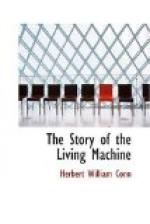These ideas arose shortly after the middle of the century, and have dominated the development of biological science up to the present time. It is evident that the aim of biological study must be to test these conceptions and carry them out into details. The chemical and mechanical laws of nature must be applied to vital phenomena in order to see whether they can furnish a satisfactory explanation of life. Are the laws and forces of chemistry sufficient to explain digestion? Are the laws of electricity applicable to an understanding of nervous phenomena? Are physical and chemical forces together sufficient to explain life? Can the animal body be properly regarded as a machine controlled by mechanical laws? Or, on the other hand, are there some phases of life which the forces of chemistry and physics cannot account for? Are there limits to the application of natural law to explain life? Can there be found something connected with living beings which is force but not correlated with the ordinary forms of energy? Is there such a thing as vital energy, or is the so-called vital force simply a name which we have given to the peculiar manifestations of ordinary energy as shown in the substance protoplasm? These are some of the questions that modern biology is trying to answer, and it is the existence of such questions which has made modern biology a new science. Such questions not only did not, but could not, have arisen before the doctrines of the conservation of energy and evolution had made their impression upon the thought of the world.
==Significance of the New Biological Problems==—It is further evident that the answers to these questions will have a significance reaching beyond the domain of biology proper and affecting the fundamental philosophy of nature. The answer will determine whether or not we can accept in entirety the doctrines of the conservation of energy and evolution. Plainly if it should be found that the energy of animate nature was not correlated with other forms of energy, this would demand either a rejection or a complete modification of our doctrine of the conservation of energy. If an animal can create any energy within itself, or can destroy any energy, we can no longer regard the amount of energy of the universe as constant. Even if that subtile form of force which we call nervous energy should prove to be uncorrelated with other forms of energy, the idea of the conservation of energy must be changed. It is even possible that we must insist that the still more subtile form of force, mental force, must be brought within the scope of this great law in order that it be implicitly accepted. This law has proved itself strictly applicable to the inanimate world, and has then thrust upon us the various questions in regard to vital force, and we must recognize that the real significance of this great law must rest upon the possibility of its application to vital phenomena.




